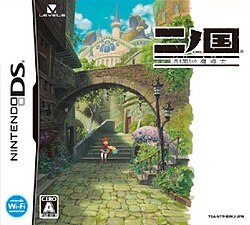Ni no Kuni: Dominion of the Dark Djinn
| Ni no Kuni: Dominion of the Dark Djinn | |
|---|---|
 |
|
| Developer(s) | Level-5 |
| Publisher(s) | Level-5 |
| Director(s) | Ken Motomura |
| Producer(s) | Hiroyuki Watanabe |
| Artist(s) | Toshihiro Kuriaki |
| Writer(s) | Akihiro Hino |
| Composer(s) |
Joe Hisaishi Rei Kondoh |
| Series | Ni no Kuni |
| Platform(s) | Nintendo DS |
| Release date(s) |
|
| Genre(s) | Role-playing |
| Mode(s) | Single-player |
| Review scores | |
|---|---|
| Publication | Score |
| Edge | 8/10 |
| Famitsu | 38/40 |
| NGamer | 84/100 |
| RPGamer | 5/5 |
Ni no Kuni: Dominion of the Dark Djinn is a role-playing video game developed and published by Level-5. It was released in Japan for the Nintendo DS on December 9, 2010. Players control Oliver, a young boy who sets out on a journey to save his mother. The game is played from a third-person perspective and its world is navigated on foot or by boat. While players navigate Oliver throughout the game's world, other characters can be controlled during battles against enemies; during these battles, players use magic abilities and creatures known as "imajinn", which can be captured and tamed.
Development of Dominion of the Dark Djinn began in 2008. The game's animated sequences were produced by Studio Ghibli, while the original score was co-composed by Joe Hisaishi. The artwork was also inspired by Studio Ghibli's other productions. The character development of Oliver was a large focus of the game, intending to make children empathize with the character and for adults to relive their adolescence. The developers chose to develop for the Nintendo DS due to its suitability for gameplay.
Following its announcement, Ni no Kuni was widely anticipated. It was acclaimed by reviewers, with praise particularly directed at its story, art style and music. An enhanced version of the game, titled Ni no Kuni: Wrath of the White Witch, was released in November 2011 for the PlayStation 3, featuring similar gameplay and story elements.
Ni no Kuni: Dominion of the Dark Djinn is a role-playing game that uses a fixed third-person perspective. Players complete quests—linear scenarios with set objectives—to progress through the story. Outside of quests, players can freely roam the open world. Players explore towns, villages, dungeons and dangerous places scattered throughout the world, and possess the ability to travel between the world and Oliver's hometown of Hotroit. Upon leaving a location, players enter the World Map, which can be navigated, or used to select a destination. The world may be fully explored from the beginning of the game without restrictions, although story progress unlocks more gameplay content and forms of transport to navigate the world.
...
Wikipedia
